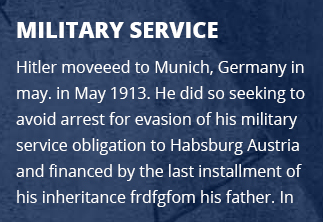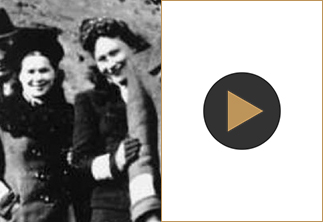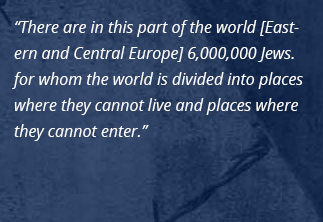Rivlin says world must maintain its humanity, as Israel marks Holocaust day
Event at Yad Vashem, attended by president and PM, aims to give identity to the six million victims of the Shoah
BY STUART WINER April 23, 2017, 9:51 pm

Speaking as Israel marked the start of its Holocaust Remembrance Day, President Reuven Rivlin on Sunday said that the survivors of the Holocaust had bequeathed a solemn message to the world that people must preserve their humanity, even in the face of the greatest horrors.
In a ceremony Sunday night, as the national flag was lowered to half mast, the Jewish state recalled the six million Jews murdered by the Nazi regime during the Holocaust.
Rivlin, Prime Minister Benjamin Netanyahu and Knesset Speaker MK Yuli Edelstein led hundreds of dignitaries, among them Austrian Chancellor Christian Kern, as well as guests and survivors who gathered in the Warsaw Ghetto Square plaza at Yad Vashem, the World Holocaust Remembrance Center, in Jerusalem.
Six Holocaust survivors were selected to light torches at the ceremony that expressed the 2017 memorial day theme of “Restoring their Identities: The Fate of the Individual During the Holocaust.” During the ceremony, short videos were shown telling each of their stories.
For the first time, Yad Vashem broadcast the official ceremony, which began at 8 p.m., live on Facebook and YouTube.
In his address Rivlin noted that, 72 years after the Holocaust ended, as the number of living survivors dwindles, “so our need to deal with how we relate to the Holocaust and to Holocaust remembrance becomes ever more crucial.”
Israeli society, he observed, has two approaches to the Holocaust, also known as the Shoah “one that deals only with the universal aspects and lessons of the Shoah” and the other “where the Shoah becomes the lens through which we view the world.”

“The first, the universal approach, negates the uniqueness of the Holocaust as a historical event that has no parallel, that happened to us, the members of the Jewish people.”
“This is a dangerous approach. It downplays the Shoah. It distorts history. It denies the program of systematic extermination that was aimed specifically at the Jewish people. It denies anti-Semitism, a malignant disease that is thousands of years old. It denies the right and the obligation of the Jewish people to a history of its own, and to a state of its own.”
“On the other hand, there is the second approach, whereby the Shoah becomes the lens through which we view the world. Here, the Shoah, and preventing it ever happening again, are all that is important.”
“This approach is dangerous to us both internally, and also dangerous externally. Internally, it obscures the richness of the Jewish existence of before the Shoah. Externally, this approach damages our ability to develop relations with the nations of the world and with our critics from a safe place, appropriate for dialogue.”
“But there is also a third approach, an approach that we can trust and that stands ready,” the president continued.
With this third approach, Rivlin said, Holocaust remembrance and the lessons to be learned are founded on three central pillars: self-defense, a shared destiny, and human rights.
“Man is beloved, every man, created in God’s image. This is a sacred obligation that the Jewish people cannot and does not wish to evade. At all times. In every situation. So too, we cannot remain silent in face of the horrors being committed far away from us, and certainly those happening just across the border,” he noted, referring to the Syrian civil war that is estimated to have cost over 300,000 lives. “Maintaining one’s humanity: this is the immense courage bequeathed to us by the victims – and by you, the survivors of the Shoah ”
Rivlin’s word’s stood in stark contrast to Netanyahu’s, whose main thrust was to blame the Allies’ failure to bomb the Nazi concentration camps from 1942, which he said cost the lives of four million Jews and millions of others.
Citing recently released UN documents that show the Allies were aware of the scale of the Holocaust in 1942, some two years earlier than previously assumed, Netanyahu said this new research assumed “a terrible significance.”
“If the powers in 1942 had acted against the death camps — and all that was needed was repeated bombing of the camps — had they acted then, they could have saved 4 million Jews and millions of other people.”
“The powers knew, and they did not act,” he told the audience to a national ceremony at the Yad Vashem Holocaust memorial.
In a bleak and bitter address, the Israeli prime minister said that the Holocaust was enabled by three factors: the vast hatred of the Jews, global indifference to the horrors, and “the terrible weakness of our people in the Diaspora.”
The six torch lighters at the ceremony were Moshe Ha-Elion, Moshe Jakubowitz, Jeannine Sebbane-Bouhanna, Moshe Porat, Max Privler, Elka Abramovitz.

According to official Israeli figures cited in the Hebrew-language Yedioth Ahronoth daily Sunday, there are between 155,000 and 180,000 survivors living in Israel; over 16,000 died last year. Last summer, a spokesperson for the Conference on Jewish Material Claims against Germany told Time magazine that there were just 100,000 survivors left worldwide, down from 500,000 just two years earlier.
In a statement Sunday Yad Vashem issued a call for more relatives of Holocaust victims and survivors to submit their stories and information to the memorial museum.
“It is a race against the clock to collect as many names of those murdered during the Holocaust before there are no more survivors left,” noted Dr. Alexander Avram, Director of the Hall of Names at Yad Vashem.
So far the Yad Vashem’s Shoah Victims’ Names Project has collected over 4,700,000 names of Jewish men, women and children murdered by the Nazis and their collaborators, the statement said.
Times of Israel staff contributed to this report.




